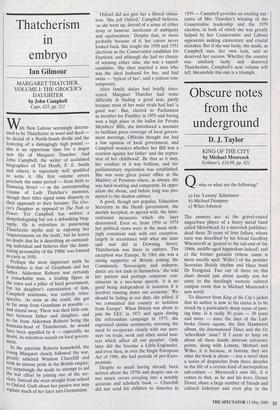Thatcherism in embryo
Ian Gilmour
MARGARET THATCHER, VOLUME I: THE GROCER'S DAUGHTER by John Campbell Cape, £25, pp. 511 With New Labour seemingly determ- ined to be Thatcherite in word and deed its denial of a North-South divide and the fostering of a damagingly high pound this is an opportune time for a major new life of Margaret Thatcher. And John Campbell, the writer of acclaimed biographies of Ted Heath, F. E. Smith and others, is supremely well qualified to write it. His first volume covers precisely the same period — from birth to Downing Street — as the corresponding volume of Lady Thatcher's memoirs, though their titles signal some disparity in their approach to their heroine: The Gro- cer's Daughter as opposed to The Path to Power. Yet Campbell has written a demythologising but not a debunking biog- raphy. He is relentless in puncturing Th atcherite myths and in exposing her improvements on the truth', but he leaves no doubt that he is describing an outstand- ing individual and believes that 'the domi- nating personality of the 1980s' was formed as early as 1950. Perhaps the most important myth he demolishes is that of Grantham and her father. Alderman Roberts was certainly a remarkable man, a leading figure in the town and a pillar of local government, but his daughter's canonisation of him, Campbell maintains, was entirely retro- spective. As soon as she could, she got as far away from Grantham as possible and stayed away. There was then little con- tact between father and daughter, and so far from Alderman Roberts being the fountain-head of Thatcherism, he would have been appalled by it — especially, no doubt, its relentless assault on local govern- ment.
In the patriotic Roberts household, the Ming Margaret closely followed the war, greatly admired Winston Churchill and took an intense pride in the British empire; Yet surprisingly she made no attempt to aid the war effort by joining one of the ser- vices. Instead she went straight from school to Oxford. Guilt about her passive war may explain much of her later anti-Germanism. Oxford did not give her a liberal educa- tion. 'She left Oxford,' Campbell believes, `as she went up, devoid of a sense of either irony or humour, intolerant of ambiguity and equivocation.' Despite that, or more probably because of it, her career never looked back. She fought the 1950 and 1951 elections as the Conservative candidate for Dartford, and although she had no chance of winning either time, she was a superb candidate. She then married a man who was the ideal husband for her, and had twins — 'typical of her', said a jealous con,- temporary.
After family duties had briefly inter- vened, Margaret Thatcher had some difficulty in finding a good seat, partly because most of her male rivals had had 'a good war'. But, elected to Parliament as member for Finchley in 1959 and having won a high place in the ballot for Private Members' Bills, she introduced a measure to facilitate press coverage of local govern- ment meetings. Officials thought she had a low opinion of local government, and Campbell wonders whether her Bill was a reaction against her father 'and the repres- sion of her childhood'. Be that as it may, her conduct of it was brilliant, and her parliamentary reputation was established. She was soon given junior office at the Ministry of Pensions where, as always, she was hard working and competent. In oppo- sition she shone, and before long was pro- moted to the shadow cabinet.
A good, though not popular, Education Secretary in the Heath government, she meekly accepted, or agreed with, the inter- ventionist measures which she later denounced. Even so, from 1950 to 1974 her political views were in the main strik- ingly consistent and, with one exception, largely in accordance with what she later said and did in Downing Street; Thatcherism was there in embryo. The exception was Europe. In 1961 she was a strong supporter of Britain joining the Community. 'Sovereignty and indepen- dence are not ends in themselves,' she told her patient and perhaps comatose con- stituents in a two-hour speech; 'it is no good being independent in isolation if it involves running down our economy.' We should be failing in our duty, she added, if `we committed this country to isolation from Europe'. When Britain was about to join the EEC in 1971 and again during the referendum campaign in 1975, she expressed similar sentiments, stressing the need to co-operate closely with our part- ners 'on trade, work and other social mat- ters which affect all our peoples'. Only later did she become a Little-Englander, and even then, as over the Single European Act of 1986, she had periods of pro-Euro- peanism. Despite so much having already been written about the 1970s and despite one or two minor errors creeping into a notably accurate and scholarly book — Churchill did not send his children to America in 1939 — Campbell provides an exciting nar- rative of Mrs Thatcher's winning of the Conservative leadership and the 1979 election, in both of which she was greatly helped by her Conservative and Labour opponents making elementary and crucial mistakes. But if she was lucky, she made, as Campbell says, her own luck, and so deserved her success. Whether the country was similarly lucky and deserved Thatcherism, Campbell's next volume will tell. Meanwhile this one is a triumph.


























































 Previous page
Previous page